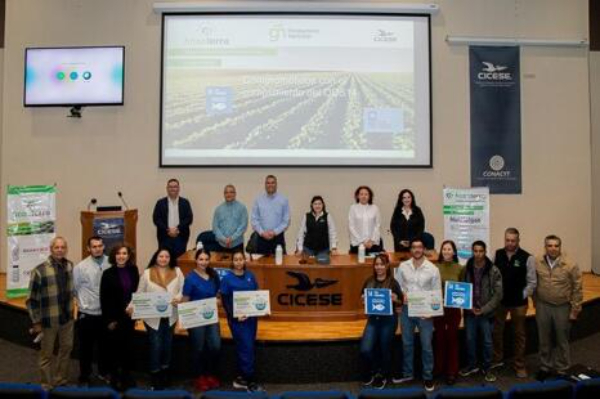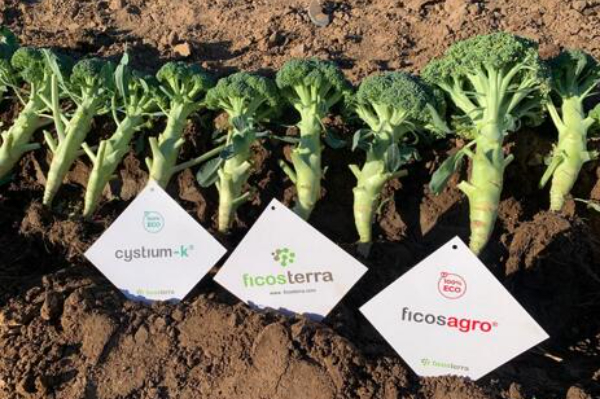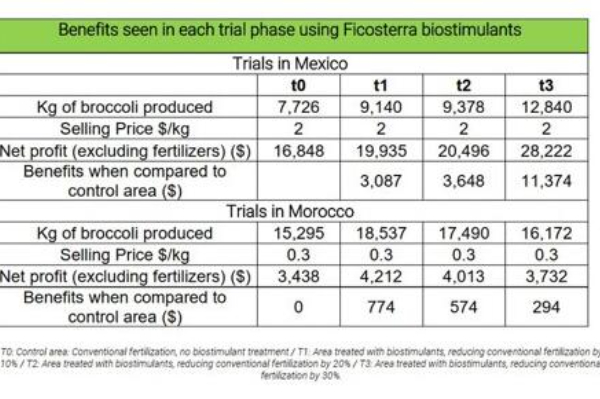
Exhibition time: 17-19 March, 2026 Shanghai, China
 中文
中文

Exhibition time: 17-19 March, 2026 Shanghai, China
 中文
中文
The "Nutrialgae" project, the only Spanish project included in the United Nations Development Program (UNDP), achieves its goal of reducing the use of chemical fertilizers while increasing productivity. This project is part of the Ocean Innovation Challenge (OIC) initiative and is managed by the marine biotechnology company Ficosterra.

Working team in Mexico. Presentation of "Nutrialgae" Results.
International trials, carried out over a year and a half with natural biostimulants, have even achieved up to 20% higher productivity, depending on soil characteristics, using 30% less conventional fertilization. The use of Ficosterra biostimulants in crop production doubles the investment, which results in a cost reduction throughout the value chain of the agri-food industry.
The Center for Scientific Research and Higher Education of Ensenada (CICESE. Mexico), GN Productores Navarro (Mexico), and the Hassan II University of Casablanca (Morocco) have been the entities with which Ficosterra has collaborated in the field and laboratory tests that have been carried out with broccoli crops as part of the OIC project. In this regard, the biostimulants of algae extracts and microorganisms, cystium-k® and ficosagro®, with an organic agriculture certification and sustainably harvested, have been used.

Cultivation of broccoli in the field in Mexico as part of the "Nutrialgae" trials.
The experts point out that there are two economic benefits to be derived from this organic agricultural project: those resulting from the reduction of fertilization costs and those from the sale of broccoli. The products used, typical of sustainable agriculture in the 21st century, have proven to have a high return on investment (ROI), having achieved an economic return three times higher than the costs. "To assess this gain in economic terms, it is necessary to take into account not so much the quantity produced but the market to which it is directed, i.e., the selling price of broccoli, which varies greatly from one country to another: two dollars/kg in Mexico compared to 0.3/kg in Morocco. Hence, the value of broccoli grown at "Nutrialgae" varies considerably and is lower in the case of Morocco," explains agronomist Alejandro Martínez, technical director of the trials.
Trials in Mexico
Science was already aware of the properties of using seaweed to improve crop yields. "Nutrialgae" has also shown that it can reduce pollution in aquifers caused by nitrogen residues present in chemical fertilizers. Now the multidisciplinary team that has worked on "Nutrialgae" has proven that the use of agricultural biostimulants promotes crop growth thanks to the fact that soils gain in porosity and capacity to absorb nutrients, salinity is reduced, soil microbial activity is stimulated, and less water is needed for the crops. "At Ficosterra, we refer to the Triple Win approach, as there are three winners who benefit from this regenerative agriculture: first of all, nature by reducing the carbon footprint and nutrient run-off; also, farmers increase their crop yields and save on agricultural inputs; and finally, people, i.e., the consumers, who can access healthier and more sustainable and eco-friendly food, that is respectful of the environment's limited resources," highlights Luis Lombana, Ficosterra's CEO.

The Ocean Innovation Challenge puts Spain's agricultural innovation on the international stage
Ficosterra, as representative of the Spanish agri-food sector, now completes the "Nutrialgae" project within the United Nations Development Program and demonstrates that a high crop yield can be achieved while at the same time taking care of the planet. The Spanish candidacy was the only one selected in the first edition of the OIC in 2020 when over 600 proposals were submitted to contribute to the progress of the blue economy and Sustainable Development Goal 14 (marine pollution reduction). This environmental challenge is supported by the Swedish International Development Cooperation Agency (Sida) and the Norwegian Agency for Development Cooperation (Norad). The final selection of initiatives was made from innovative, replicable, and scalable public and private projects that promote the restoration and protection of the oceans and coasts.
The commitment to sustainable agriculture has already led to two success stories for Ficosterra.
As part of the UNDP/OIC award, the organization will develop a support program for Ficosterra to open new business opportunities related to "Nutrialgae" research. One of these actions is the fiConcept project being managed with the islands of Sao Tome and Principe. This project offers a multidisciplinary portfolio of consulting services for sustainable algae management. Ficosterra is already preparing a proposal for technology transfer services to support these islands in achieving their Sustainable Development Goals.
The solutions being worked on are based on the evaluation of the use of seaweed to generate agricultural, livestock, and energy products, specifically in the application of biotechnology to transform seaweed (Sargassum spp.). The aim is to reduce the deterioration of soil fertility caused by the excess of chemical fertilizers, nitrogen, and phosphorus run-off into the oceans and the increasing costs of fertilizers and food, as well as methane emissions from animals.
As part of the UNDP/OIC award, the organization will develop a support program for Ficosterra to open new business opportunities related to "Nutrialgae" research. One of these actions is the fiConcept project being managed with the islands of Sao Tome and Principe. This project offers a multidisciplinary portfolio of consulting services for sustainable algae management. Ficosterra is already preparing a proposal for technology transfer services to support these islands in achieving their Sustainable Development Goals.
The solutions being worked on are based on the evaluation of the use of seaweed to generate agricultural, livestock, and energy products, specifically in the application of biotechnology to transform seaweed (Sargassum spp.). The aim is to reduce the deterioration of soil fertility caused by the excess of chemical fertilizers, nitrogen, and phosphorus run-off into the oceans and the increasing costs of fertilizers and food, as well as methane emissions from animals.
Another success derived from the collaboration in the "Nutrialgae" project is the agreement reached this month between GN Productores Agrícolas, through its subsidiary Croptek, and Ficosterra America to research, develop, use and, if necessary, commercialize organic products. In parallel, GN Productores Agrícolas will incorporate the biostimulants cystium-k® and ficosagro® into the company's crop fertilization plans, while Croptek will also expand its product portfolio with biostimulants developed by Ficosterra America.
Source: Ficosterra
